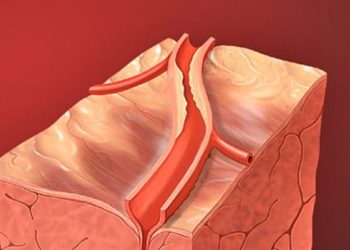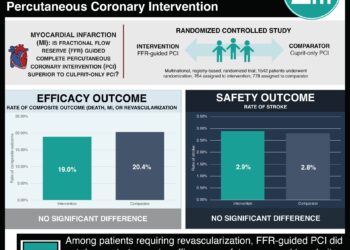Early invasive strategy associated with reduced cardiac death after acute coronary syndrome
1. From a cohort study of Danish patients presenting with acute coronary syndrome, early invasive revascularization interventions were associated with reduced cardiac mortality when compared to conservative invasive strategies.
2. Early intervention was also associated with decreased all-cause mortality and re-hospitalization within 60 days compared to conservative intervention.
Evidence Rating Level: 2 (Good)
Study Rundown: Acute coronary syndromes (ACS), which include heart attacks, are caused by blockage of blood flow to the heart and are the leading cause of death in the US and Europe. Treatment of ACS involves invasive strategies, such as coronary artery stenting or bypass surgery, to allow blood to resume flowing to heart tissue. Although several guidelines recommend early invasive strategies (EIS), undertaken within 72 hours of hospitalization, over conservative invasive strategies (CIS), undertaken after 72 hours of hospitalization, the beneficial effects of these strategies has not been evaluated. This study examined EIS vs. CIS in all patients hospitalized with ACS in Denmark between 2005 and 2011; EIS was recommended in Denmark in 2009, allowing comparison of outcomes before and after wide-scale implementation of EIS. Overall, patients with ACS who underwent EIS had significantly lower all-cause death, heart-related death, and re-hospitalizations than patients who underwent CIS. Due to data limitations in Danish health registries, this study was unable to evaluate potential confounding factors that may have influenced results, such as reasons why certain patients received EIS versus CIS before national guidelines were established. Furthermore, this study drew only from patients in Denmark, and the results may not reflect more diverse populations elsewhere. Nevertheless, these results provide strong evidence that EIS may effectively reduce death and re-hospitalization following ACS than delayed interventions.
Click to read the study published today in the Annals of Internal Medicine
In-Depth [retrospective cohort]: This retrospective cohort study analyzed all patients admitted to Danish hospitals for ACS between 2005 and 2011. Of the 54 694 patients admitted for ACS, a total of 19 704 were propensity-matched (9 852 EIS patients were matched with 9 852 CIS patients; unmatched patients were excluded from comparative analyses). Outcomes data were gathered for the 60 days following initial hospitalization. Among matched patients, EIS was associated with decreased cardiac-specific mortality (5.9% vs. 7.6%, adjusted HR 0.75, 95%CI 0.66–0.84), all-cause mortality (7.3% vs. 10.6%, adjusted HR 0.65, 95%CI 0.59–0.72), and re-hospitalization for myocardial infarct (3.4% vs. 5.0%, adjusted HR 0.67, 95%CI 0.58–0.77). Notably, being female, being older than 75, and being diagnosed with myocardial infarction at time of presentation (instead of unstable angina) were all associated with increased subsequent risk of cardiac death following initial hospitalization for ACS.
Image: PD
©2015 2 Minute Medicine, Inc. All rights reserved. No works may be reproduced without expressed written consent from 2 Minute Medicine, Inc. Inquire about licensing here. No article should be construed as medical advice and is not intended as such by the authors or by 2 Minute Medicine, Inc.






